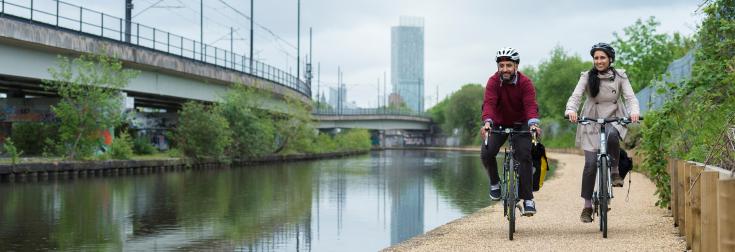Urban mobility in Kilkenny: policy recommendations

On 3 and 4 November 2021, the Policy Learning Platform organised an online peer review for the benefit of the Kilkenny County Council (KCC), Ireland, on urban mobility with a focus on rellocation of urban space, car restrictive policies, and building stakeholder support.
A detailed list of challenges and recommendations can be found in the follow-up report.
Current state of affairs
The Kilkenny City and County Development Plan 2021 – 2027 prioritises sustainable transport, through the land use strategy of compact growth, strengthened investment in the rail and city bus services and continued development of walking and cycling infrastructure in support of the 10-minute city concept. KCC is currently preparing the Local Transport Plan, a short to medium term plan to support the development of a comprehensive, sustainable transport network for the City. Given the projected population growth of 30% for Kilkenny, a significant increase in the numbers choosing active transport is required to meet the proposed mode share targets.
The city centre is among the areas where active travel should replace traditional car journeys in the future, and therefore, after having set up its own internal consultation group, KCC sought input from external peers on successful reallocation of public space, introduction of car restrictive policies and other solutions that facilitate a shift to sustainable transport in the city on one side, and on the other on how to gain broad based support for modal shift and sustainable transport in the city centre from retailers, businesses, residents and concerned citizens.
Peers from across Europe
Alongside Katharina Krell and Astrid Severin, our low carbon economy and environment and resource efficiency Thematic Experts, five excellent peers were invited, and participated in the peer review:
- Brian Caulfield, Trinity College Dublin, Ireland
- William Pratt, Devon County Council, UK
- Brian Masson, Multi Modal Transport Solutions Ltd., UK
- Gordana Kolesaric, Maribor Municipality, Slovenia
- Ioannis Politis, Aristotle University of Thessaloniki, Greece
The experts came together to share their experience and to provide recommendations for ways of tackling Kilkenny’s questions related to the mobility transition. They provided the host with valuable insight, know-how and practical suggestions for solving the challenges presented above.
Recommendations
The peers detailed packages of measures for the reallocation of public space in the city centre focusing on the increase of urban space efficiency, attractiveness of public transport, more public space for citizens and better road safety and accessibility for all. Multiple options for space reallocation were presented, including pedestrianisation, one-way streets, parking space management, shared use, time and modal filters to keep cars out of the city centre.
Regarding the challenge of building broad public support for the mobility transition, key recommendations included not making the transformation about mobility, but about well-being and vibrant city centres, reassuring retailers that their mobility needs will still be met and reducing uncertainly with proactive, upfront communication.
The host’s policy challenges and all the peer suggestions can be found in the follow-up report.
Pleased with the outcome of two full days of intense talks moderated by the Policy Learning Platform, the hosts reported that the experience had been very helpful and informative to them, confirming that KCC was heading in the right direction and providing plenty of useful input.
Local peer review coordinator Caitriona Corr concluded that “The whole process was hugely beneficial and the peers were amazing. We felt a little bombarded after the process but it is all hugely positive.” Elected official Maria Dollard said “It has been so useful for me. Hopefully this session on consultation will lead to us doing a much better job bringing people along with us.” The Regional Authority commented that the peer review had been very timely given that the Southern Regional Assembly is about to launch important public funding for the mobility transition.
From the side of the peers, Gordana Kolesaric from Maribor municipality found that “it was an excellent experience to cooperate with experts with so many experiences. I have gained new knowledge in this peer review and am appreciating all the contacts from this event”, while Brian Masson thanked “the Policy Learning Platform for providing such an excellent resource to help stakeholders across Europe.” Ioannis Politis underlined that “Interreg Europe is a good mediator for good practice exchange, including good and also bad experiences, which particularly helps the learning process.”
The host used the peer review to involve local stakeholders in a very lively discussion, including elected representatives and officials from Planning and Roads in Kilkenny County Council, representatives of the Southern Regional Assembly, the Sustainable Transport Group, Kilkenny, local transport representatives, Secondary School students, access groups and community and employer representatives.
Check out the experts' recommendations in the follow-up report.
Credit: Image from RESOLVE
2021-11-3 Kilkenny
Follow-up report of the peer review in Kilkenny.